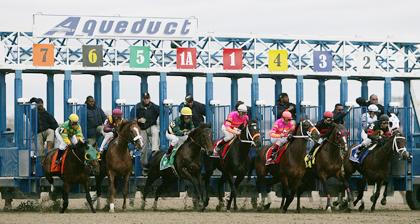By Howard Koplowitz
The state Lottery Division said it chose not to give a gaming license to Aqueduct Entertainment Group, which led to the collapse Thursday of the deal the consortium had with the state to build 4,500 video lottery terminals at Aqueduct Race Track, because the group had continually changed its major players and involved people who did not have “high standards and credibility” in its bid.
“AEG continued to make significant changes to their investment and management groups on a routine basis,” a Lottery official told TimesLedger Newspapers.
The official said AEG had “a pattern of involving unqualified people and entities” in its bid who were removed from the group only when the Lottery said they were unacceptable.
When asked who specifically the Lotterry deemed undesirable, the official would not name names but said the Rev. Floyd Flake and rapper Jay-Z, who both severed their ties with AEG this week, were not among them. The two had not supplied personal information to the agency, the Lottery said.
The official said some AEG investors “did not have high standards and credibility.”
“We want to make sure we’re bringing people of higher standards” into the VLT contract, noting it is worth hundreds of millions of dollars, the official said.
The ongoing investigations into the selection of AEG being conducted by the state inspector general and federal prosecutors also “raised a red flag,” the official said.
AEG claimed it submitted all of its gaming license applications Tuesday to the Lottery, but the agency said that was not the case.
The official said AEG also had said certain individuals involved in the consortium should be excluded from Lottery scrutiny because AEG dropped them from the bid.
“Such removals shouldn’t be accepted,” the official said, noting if that was permitted it would give the impression that AEG was “allowed to conceal relevant information” from the Lottery’s review of the consortium.
“At the 11th hour, you can’t change your mind,” the official said.
Earlier in the day Gov. David Paterson’s office released a short statement saying the state was backing out of its support of AEG because it had been denied the license.
“The Division of the Lottery has concluded that it cannot issue a gaming license to Aqueduct Entertainment Group. Therefore, the state has officially withdrawn its support for AEG to develop and operate a video lottery terminal facility at Aqueduct Race Track,” the statement said.
AEG hinted it may sue the state if it is not given the chance to correct the problems the Lottery had identified in not giving the group a license.
“The state’s decision to withdraw Aqueduct Entertainment Group’s designation is both arbitrary and capricious,” AEG attorney Barry Berke said in a statement. “In the event that AEG is not given an opportunity to address the issues raised by the Lottery, and the decision to reverse the prior selection of AEG as the successful bidder is not reconsidered, AEG intends to pursue all available remedies.”
It remains unclear how a new process to select another bidder will work. Whether one of the losing bidders will be chosen or a rebidding process will start again is up in the air.
Just days after state leaders chose AEG, Paterson met with Flake, who earlier had indicated that he might support state Attorney General Andrew Cuomo for governor. Paterson wound up abandoning his election bid earlier this month amid a controversy over a domestic abuse allegation involving one of his top aides. State Assemblywoman Audrey Pheffer (D-Rockaway Beach) said a new process to select another bidder was being developed.
She said the process may work like the state procurement process, which sets rigid timelines and tells bidders what the state wants instead of the bidders submitting their own plans.
Paterson appeared to favor that concept in the statement from his office.
“The executive branch advocates that the selection of the Aqueduct VLT franchisee be done pursuant to an expedited, transparent, apolitical and publicly accountable procurement process,” he said.
Pheffer called the AEG deal collapse “very upsetting.”
“Our goal is to bring jobs to our community and the governor basically failed on this twice,” she said, referring to the prior deal with Delaware North, which collapsed in March 2009 after the Buffalo-based company could not come up with the $370 million it promised the state.
Addabbo took issue with the Lottery’s decision to scuttle the AEG bid, saying it had all the information from the bidders “for over a year” and “all of a sudden AEG is unlicensable.”
The senator said he understood the Lottery would make a recommendation on a new bidder but that the final decision would still be between Paterson, state Sens. Malcolm Smith (D-St. Albans) and John Sampson (D-Brooklyn) and Assembly Speaker Sheldon Silver (D-Manhattan).
Addabbo said he favored choosing one of the losing bidders instead of opening up a new process.
“My only concern is time. In my opinion, time is of the essence,” he said.
The state has relied on the VLT project to help close a budget deficit now running in the billions. It counted on having $200 million from the winning VLT bidder to be used toward the next fiscal year budget gap.
Reach reporter Howard Koplowitz by e-mail at hkoplowitz@cnglocal.com or by phone at 718-260-4573.



































